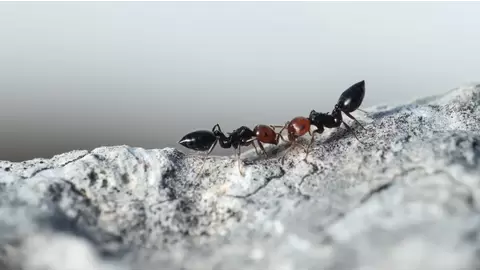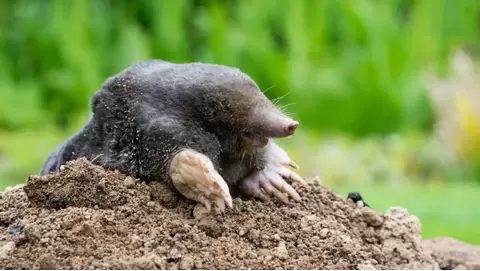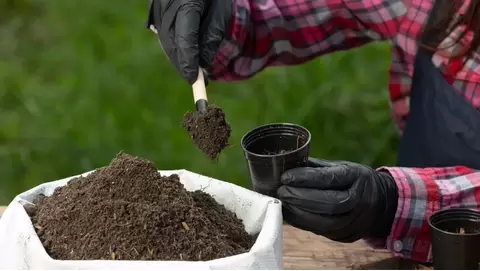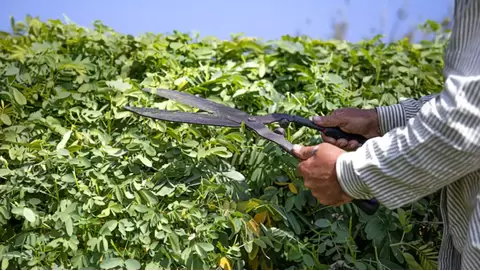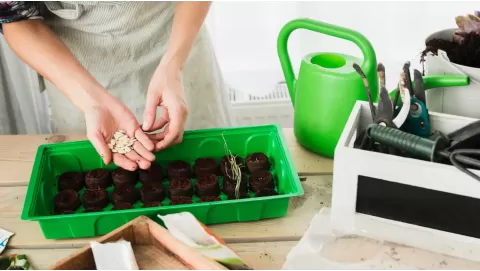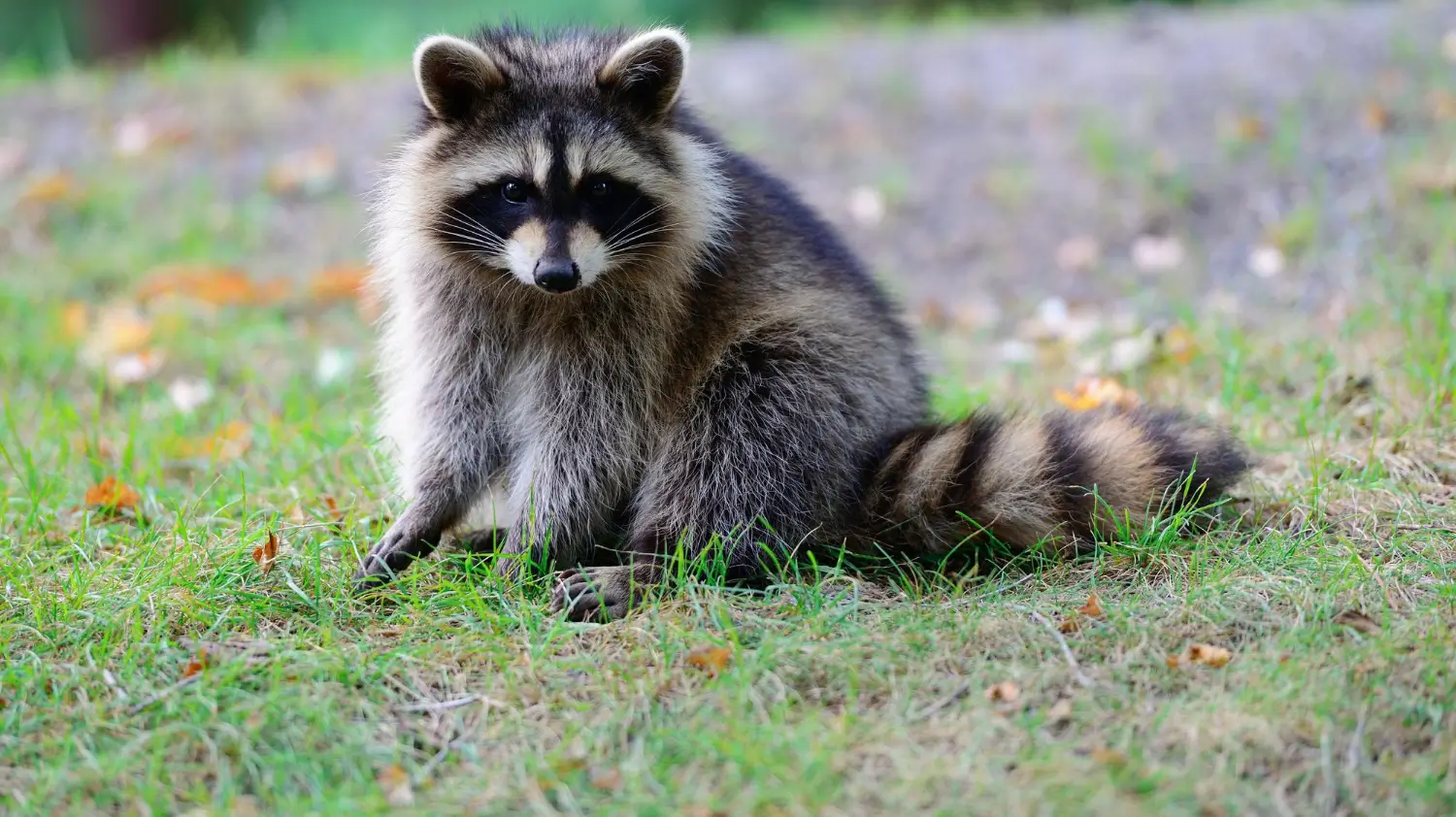
Best skunk repellents to protect your yard and home naturally
Skunks are small nocturnal animals. They are known for their strong and unpleasant smell. Skunks usually stay away from people. But when they enter yards or gardens, they can be problematic. Skunks forage and dig in the soil for food such as insects and grubs. This digging can ruin lawns and kill plants. When frightened, they release a difficult-to-clean, pungent-smelling liquid that lingers for a long time.
MEET THE EXPERT
- ■ Bill Dowd is the founder and CEO of Skedaddle Humane Wildlife Control, a company specializing in humane skunk removal across Canada and the U.S. With over three decades of experience, Bill advocates for non-lethal methods like removal and reuniting, emphasizing the importance of prevention through exclusion barriers.
- ■ Animal Capture Wildlife Control is a Los Angeles-based company specializing in skunk removal. With over 20 years of experience, they offer professional skunk removal services, including trapping and exclusion, to prevent future infestations.
The ideal way to drive off skunks from the property without harming them is by applying skunk repellent for yard. The natural repellents are great options as they are safe and non-toxic to kids, pets and other beneficial critters, such as birds, bees, and butterflies.
Skunk Behavior and Ecology
Skunks are generally out at night, they are most active in the evening as the sun goes down and are nocturnal animals. They sometimes poke holes in the lawn or garden looking for insects, grubs and worms, which can harm lawns and plants.
Skunks are also territorial, so they will often return to the same place in search of food or shelter. If a skunk decides on an area, it may dig a den under a porch, deck or outbuilding.
Skunks have an amazing sense of smell. It relies on smell to locate food, to navigate its environment and to avoid danger. If it’s frightened, it will defend itself by spraying a strong smelling foul liquid from its glands. This spray can land several feet away and is extremely difficult to scrub away.
Risks of Skunk Encounters
One of the main concerns with skunks is their spray. The odor is truly terrible; it can permeate clothes, cling to pets, and even seep inside the home. It can be a lot of work to clean it up. The odor is not tolerated by many and proves difficult to eradicate.
Skunks also carry several diseases. Among the most serious is rabies, which they can pass on to other animals or even humans through bites. They can also transmit leptospirosis, which they shed through their urine and can foul soil or water. These risks to health are the reason why it is critical for people, pets, and children to be kept away from skunks.
Importance of Natural Skunk Repellents
For those who are looking to keep skunks away, many people are looking for something that is safe for the environment, safe for their family, and safe for their pets. That is why natural repellents are a go-to for so many people. They assist in solving the problem without the use of harsh chemicals that damage nature.
No Harmful Chemicals or Damage to the Environment
A lot of chemical repellents are harsh and can also be damaging to the soil, the plants and the water of the area. Such products can also be dangerous for pets, children and beneficial insects, such as bees and butterflies.
Natural repellents are composed of safe substances, such as plant oils or powerful odors. They do not pollute the land or poison the animals. Instead, they just create a stink that they hope skunks will not enjoy and will want to stay away from the area. In this way, people can repel skunks without harming the environment.
Safe for Organic Gardens and Wildlife
Homemade solutions are effective for those who grow fruits, vegetables or herbs without chemicals. These repellents are not so bad for plants or for the quality of the soil, so they could be good choices for organic gardeners.
They are a wise option for those who want to protect other animals like birds, butterflies and squirrels. Natural repellents work on skunks by employing odors the animals don’t like. They don’t hurt other animals or deter them from entering the garden.
Epic 6# Skunk Scram Bag
One of the most trusted natural skunk deterrents is Epic Skunk Scram™ Granules available at Growcycle. It comes in a 2.5-lb shaker jug and is easy to apply around gardens, lawns, and homes. This product uses smells they dislike to help stop skunks from digging or settling near buildings.
How It Works
- The best skunk repellent granules are imbued with natural odors that skunks do not like.
- When users sprinkle these odors on the ground, they form a barrier that skunks won’t cross.
- Skunks won’t come again after enough runs.
Key Benefits
- Easy to use: No mixing, no measuring, no mess, just shake then apply.
- Long lasting: A single application can last up to 30 days.
- Pet- & child-friendly: Made from natural ingredients that are not harmful when used correctly.
- Decomposable: Naturally breaks down in the soil, so it's safe for the earth.
- Mess-free Application: The shaker top makes spreading easy and clean.
Best Places to Use
- To border flowerbeds and vegetable gardens
- Along fence lines or walkways
- Close to porches, decks, sheds, or crawl spaces
- Anywhere skunks have been seen or signs of digging are found.
DIY Natural Skunk Repellents
Many people prefer natural, homemade repellents to keep skunks away. These easy recipes use common ingredients found at home or in stores. They are safe for people, pets, and plants when used properly. Homemade repellents work by using strong smells or irritants that skunks dislike. Here are some popular and effective options:
1. Peppermint‑Oil Spray
Peppermint oil has a strong, clean scent that most skunks dislike. To create a peppermint spray, add 10-15 drops of peppermint essential oil to one cup of water. Shake to combine and transfer to a spray bottle.
Spritz the blend around the foundation of the house, garden beds, along fences and near any holes and gaps where skunks could enter. User can reapply every few days or after rain, It’s best, as the scent can fade fast.
Most plants and animals can handle a bit of peppermint oil, but keep it away from delicate plants and flowers, as it could damage their leaves. This spray does double-duty; it’s not only a repellent for skunks but also can help keep mice and insects at bay.
2. Castor Oil + Dish Soap Mix
This blend contains castor oil which repels most any mammal including skunks, moles, and rabbits. Castor oil stinks and tastes awful to them. To prepare the spray, mix 8 ounces castor oil with 8 ounces liquid dish soap in 1 gallon water. Combine thoroughly in large spray gun or garden sprayer.
Generously spray the solution on garden beds, lawns and other areas users know skunks dig. The soap allows the oil to mix with water and cling to plants and soil. Reapply every 1-2 weeks or after a large rain.
This skunk control is safe for pets and plants, but avoid overuse on young or sensitive plants. It works by confusing skunks’ sense of smell and taste, making the area unpleasant.
3. Spicy Pepper Solution
Skunks dislike spicy smells and tastes. A homemade spicy spray can keep them away by irritating their noses and mouths. To make this spray:
- Roughly chop 1 small onion, 2 to 3 jalapeño peppers (or any hot pepper), and add 1 teaspoon of cayenne pepper.
- Dump these into 4 cups of water and let them boil for 20 minutes.
- Let the mixture cool until it is at room temperature, then strain out the solids.
- Strain the spicy liquid into a spray bottle.
This mixture can be sprayed outside toward the edges of the garden, near burrows, or other areas frequented by skunks. Don’t spray plants directly, as the spicy mix could burn leaves. Also, wear gloves when handling the spray and don’t touch the eyes or skin. For best results, reapply every few days or after rain.
4. Citrus Peel Barriers
Skunks dislike the smell of citrus fruits like oranges, lemons, and grapefruits. Using fresh citrus peels is an easy way to keep them away. Simply scatter fresh orange or lemon peels along garden beds, near fences, or around trash bins. The natural oils in the peels produce a strong scent that repels skunks.
When the peels dry or decay, the smell diminishes, so replace them every few days. First dry the peels in the sun or substitute dried citrus peel powder for long term results. This process is also really low risk and it’s a great way to use up leftover peels and minimising food waste.
5. Ammonia‑Soaked Cotton Balls
If people have ammonia, pour some in a shallow dish, it has a really strong smell that will chase the skunks away; it stinks like predator urine and chemicals, surely they won’t want to mess around with it. To use this method:
- Use cotton balls soaked in household ammonia.
- Put the soaked balls in containers with small holes or mesh lids to let the smell waft, but keep pets or kids from touching them.
- Place these containers near skunk burrows, under decks or near areas where skunks enter the yard.
Switch out the ammonia cotton balls every several days to maintain the remedy’s scent.
Safety Note
Ammonia is toxic and can irritate skin, eyes, and lungs. As always, make sure to keep ammonia and ammonia-soaked balls of cotton out of the hands of small children and pets. Only try this in an area animals and people will not accidentally stumble upon it.
Preventative Yard and Home Maintenance
Preventing skunks from returning often begins with making the yard and house less appealing to them. By eliminating food sources, thwarting shelter spots and changing landscaping, people can naturally lessen skunk visits and make their property safer.
Remove Food Sources
Skunks go to yards primarily to search for food. Eliminating easy sources of food helps to deter them.
- Use garbage cans with tight-fitting lids or place heavy rocks on the lids so that skunks are not able to enter them. It can be helpful to use plastic bins with locking lids.
- Skunks are attracted to outdoor pet food that has been left out overnight. Feeding animals indoors or picking up any remaining food after mealtime keeps skunks at bay.
- Skunks are particularly appreciative of any fruit that falls from trees and around rotting compost. Promptly picking up fallen fruit and managing compost piles with sealed bins or turning them frequently also reduces attraction.
Eliminate Shelter Opportunities
Skunks prefer to hide and make dens in dark, quiet spots near food and water. Removing these denning sites will prevent skunks from taking up residence.
- Skunks regularly reside under decks, porches or out buildings. Filling these gaps with wire mesh or hardware cloth will stop skunks from entering and making a nest.
- Skunks will hide in woodpiles, brush, debris near the house. Moving these piles at least 10 feet from the foundation, or neatly stacking firewood on racks, will make the area less appealing.
Landscape Design Strategies
Certain plants and backyard setups can discourage skunks by eliminating their preferred hiding places or by making the area less hospitable.
- A whiff of some plants is enough to deter skunks from crossing the path, especially members of the allium family, such as garlic, onions and chives. Plant these close to garden beds, near fences or around fruit trees to help ward off skunks.
- Thick ground cover and tall grass are places for skunks to hide and stay secure. Regularly mowing grass short and cutting back dense bushes near the home reduces hiding places and the wild-eyed appeal of the yard.
Application Tips and Best Practices
When it comes to skunk spray prevention, proper use goes a long way. Following these easy methods can enhance your results and keep the skunks away for longer.
Reapply After Rain or Irrigation
Natural repellents usually do not smell when wet. Spreading them again by spraying, watering of the garden or lawn irrigation after heavy rain is essential. This maintains the scent strength and its protectiveness. Homeowners need to monitor treated areas frequently and reapply as necessary especially in wet seasons and following storms.
Rotate Between Different Scents
Skunks can habituate to one smell if it is being used all of the time. Changing it out frequently, using a spray of peppermint oil one week and a mix of castor oil next, for example, can prevent skunks from becoming accustomed to the smell and ultimately ignoring it. Adding some diversity of odors makes the yard less predictable and even more uncomfortable for skunks.
Combine Methods for Best Results
The best technique for repelling skunks will involve several methods simultaneously. The use of a commercial repellent, a home-made spray and good yard maintenance create a series of barriers that skunks do not want to cross.
Organic Ways to Deter Skunks
For instance, placing granular repellents along the garden perimeter, hanging pouches of peppermint oil near entrances, and blocking off dens all contribute to keeping skunks out safely and organically.
Safety and Environmental Considerations
When using natural skunk deterrents, it is important to keep safety and the environment in mind. Natural repellents are safer than chemicals, but some precautions are still needed.
Pet and Child Safety Around Homemade Sprays
Homemade sprays often rely on natural ingredients, but they can irritate skin, eyes or noses, such as ammonia or spicy pepper solutions. It is important to:
- Keep sprays and treated areas away from children and pets.
- Do not spray directly where pets or children go.
- Keep any homemade mixtures in a safe environment and clearly label all containers.
- After applying any repellent, wash the hands.
Impact on Non-Target Wildlife
Natural repellents tend to preserve the yard and just make it unappealing to an array of wild animals that find the area more troublesome. Some strong smells, though, such as garlic or castor oil, may annoy bees, butterflies or other beneficial insects. To reduce impact:
- Do not spray flowers and blooming plants visited by pollinators.
- Apply repellents primarily around garden perimeters or where skunks feed.
- Opt for mild, plant-based ones with formulations meant to be safe for wildlife.
Legal and Humane Wildlife-Control Guidelines
It is important to follow local laws and use humane methods to handle wildlife such as skunks. Skunks are part of the ecosystem as they eat insects and small rodents.
- Do not trap or kill skunks unless it is legal and handled by a professional.
- Repellents and prevention to help skunks move on safely.
- Make sure to read the local wildlife laws before attempting to control skunks.
FAQs
How to keep skunks away from the house?
Get rid of food sources such as pet food and garbage, seal hiding spots, and employ natural repellents, such as peppermint spray or castor oil, in a circle around the house.
What is the best homemade skunk repellent?
Many skunks dislike the strong scent of peppermint oil, so it makes a great repellent, and it's safe for your plants and pets.
What smell do skunks hate the most?
Skunks despise pungent, spicy and sharp odors, such as those from pepper, ammonia, garlic and citrus.
The Bottom Line
Skunks can become quite a nuisance in yards and homes. Natural repellents are a safe and effective means to repel skunks. The use of natural items such as peppermint oil spray, castor oil mixes, and even ‘natural’ granules can help protect the property without harming the skunks or the environment.
Check Growcycle for natural safe garden and pest control products for people, pets and the planet. Their skunk repellent for yard versions are natural and simple to apply.
Disclaimer: This material is for informational purposes only and should not be relied on for legal, medical, financial, or any other form of professional advice.




